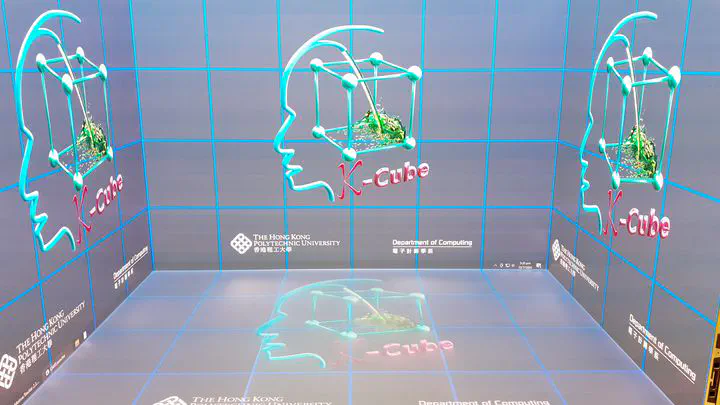K-Cube

About K-Cube AI
AI knowledge graphs in immersive virtual reality environments provide the opportunity to enhance the edu-metaverse for interactive teaching and learning. This is an innovative approach to active learning that combines advanced metaverse technology with educational content. The K-Cube project is the first prototype of its kind. It combines multiple modes of 3D, immersive, interactive representations of knowledge points, where concepts and their interrelationships are visually depicted. The K-Cube immersive knowledge graphs encompass various academic subjects, providing students with a comprehensive understanding of topics. In our current CAVE virtual reality environment, students can interact with knowledge graphs guided by an AI virtual assitant and explore relationships between concepts. This interaction promotes knowledge retention, active learning, and critical thinking. It also allows for a personalized learning experience, as students can navigate through the knowledge graph and create their own knowledge bubbles. The K-Cube immersive AI knowledge graph aims to revolutionize immersive teaching and learning by making complex information accessible and engaging. The development of the K-Cube AI started in 2021 as a strategic initiative project in the Department of Computing, at The Hong Kong Polytechnic University. The project was showcased to government officials and the general public in July 2022 at the InnoMart Expo, in the Hong Kong Science Park. It has achieved international recognition in top academic journals such as the IEEE Transactions on Learning Technologies (Dec. 2023, May. 2024), and international conferences, such as the International Conference on Blended Learning, (ICBL 2022), the International Conference on Web-Based Learning (ICWL 2022 and 2023), and the Annual IEEE International Conference on Metaverse Computing, Networking, and Applications (IEEE MetaCom 2024).
The K-Cube project has received the Best Paper Award at the 21st International Conference on Web-based Learning (ICWL 2022). The Hong Kong Children’s Hospital has been involved in developing a simulation of the perioperative journey in the operating theatre to help children cope with their fears of medical procedures. The K-Cube project has been part of new immersive presentation styles in the classroom accompanied by AI assisted virtual agents, such as Virtual Peter. The K-Cube project has recieved much attention from multiple local and international organizations. It strives to bring together AI and the metaverse to enable an immersive learning experience for all ages.
Comments